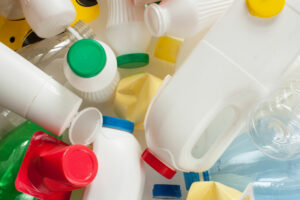Most of us know the basics of a healthy lifestyle — eats lots of fruits and vegetables, stay away from caffeine and sugar, don’t smoke, exercise regularly, etc. Taking good care of our bodies not only enhances our overall wellness, healthy choices like these can also boost fertility.
But what about choices we don’t even realize we’re making?
Countless studies have shown that our environment — which we don’t always have control over — can have a significant impact our health. And now, new research is emerging that shows certain types of chemicals found in everyday items, food and water are negatively impacting fertility.
The two biggest culprits: microplastics and EDCs.
How Microplastics Can Affect Fertility
Even the most earth-conscious among us can’t completely avoid using plastic. It is everywhere — in our food packaging, household products, furniture, clothes, cars, … and the list goes on.When plastic is exposed to sun/heat, wind and water, it degrades into small particles called microplastics. These non-degradable materials get into our ecosystem through landfills or the ocean, and can ultimately contaminate our food and water. When we ingest them, they accumulate in our tissue and can affect how our bodies function.
For an example of how heat causes plastic to break down into microplastics, one study compared hot coffee poured into a plastic cup vs. a glass cup. After 15 minutes, the water in the plastic cup was analyzed and found to have 25,000 microplastic particles in it.
Microplastics act like a sponge and “soak up” heavy metals, which can be harmful to the body. In fact, new data shows that these microplastics can specifically affect sperm quality, and therefore negatively impact fertility.
MPs accumulate in tissue, including the testicles. They cause inflammation, which leads to tissue damage. This can affect sperm production as well as the quality of the sperm, which can make it harder for a couple to become pregnant.
Endocrine Disrupting Chemicals and Fertility
Endocrine disrupting chemicals, or EDCs,are found in food packaging, pharmaceuticals, personal care products such as make up, food additives and other sources. EDCs mimic the activity of steroid hormones such as estrogen, progesterone and testosterone, which can interfere with the body’s own production of these hormones. They also affect the cells of a very early embryo during pregnancy.Two common examples of these chemicals are bisphenol A and phthalates.
Bisphenol A (BPA) is used in food packaging such as plastic boxes, cash-register receipt paper, and the lining of canned-food containers. BPA is released at high temperatures (such as in the microwave or dishwasher), or when it comes in contact with acidic foods.
Phthalates are used to make plastic soft and flexible, and as a preservative for scents in personal care products. These EDCs have been shown impact women who are trying to conceive. They can contribute to poor egg quality, or cause changes to the genetic material in the early stages of fetus development. They may also cause early puberty in young girls.
In men, EDCs have been shown to lower testosterone, which can lead to lower sperm production and poor sperm quality.
Avoiding Microplastics and EDCs
All of this might sound a little scary, and you’re probably wondering: What can I do?While there are factors outside your control, there are some simple steps you can take to reduce your exposure to microplastic particles and EDCs.
Whenever possible, eat unprocessed foods — preferably organic foods that are free from pesticides. Don’t use pots and pans that have Teflon or other coatings. Never drink out of plastic cups or bottles, instead choose reusable bottles made of stainless steel or glass. Also, try not to microwave food or beverages in plastic containers.
For personal care products, use unscented or natural products. Plastic recycling code 7 means the packaging might contain BPA, and recycling code 3 indicates use of phthalates, so avoid products with those label codes.
While research in this area is still emerging, couples who are struggling to conceive should do their best to limit their exposure to microplastics and EDCs to increase their chances of conception. If you have questions or want more information about how environmental factors can impact fertility, call us at (502) 897-2144.








